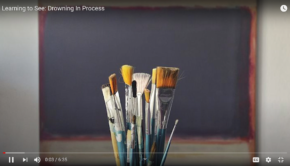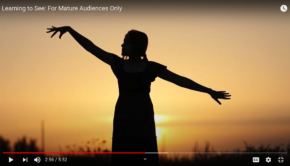
Playing the Rest
When I was in middle school I took piano lessons begrudgingly. I loved the idea of playing complicated, beautiful pieces on the piano, but loathed practice with every fiber of my being.
As you can imagine, my playing was not so great.
I would sit with the music in front of me on the piano, fingers poised, foot hovering over the pedal and launch into the tricky bits, racing past the rests, stumbling through (and slaughtering) the music. At each “practice” my mom would stick her head in and remind me to slow down but, instead I would just give up.
I was talking with my friend Ryan about this the other day. He is an accomplished professional musician who also teaches piano and guitar to students of various ages. After a particularly long day of teaching he lamented how challenging it is to get young students to understand the value of “playing the rest.” When a piece of music is written it isn’t only the notes that are included; the pauses in the music are notated as well – just like punctuation in a paragraph. Sometimes it’s tempting to blow right through those musical commas and periods on the way to the great big exciting exclamation mark!
But, rests aren’t merely speed bumps. While notes aren’t played the music continues; you continue counting the beat, your hands and ears are simply at rest. These rests have equal weight and value as the notes; so, if you don’t “play the rest” you aren’t playing the music as written any more than if you skipped a few notes!
The rests give the music meaning. They give it space to breathe; to land – in our ears and our souls. Without the rests the music is jumbled, chaotic, frenetic and meaningless.
Essentially, the rests make the notes into music.
So, here’s the question – how often are you Playing the Rests in your life? If you are like most, the answer is “probably not enough.” In Julia Cameron’s, The Artist’s Way her two main practices are Morning Pages and Artist’s Dates. While people sometimes struggle with a daily journal of Morning Pages, time after time I find people aren’t even willing to consider taking Artist’s Dates. You’d think it would be easy for creative people to make room to rest, to play, to do things that inspire and restore us. But, nope! We tell ourselves we don’t have time.
And who can blame us? We already struggle to get everything done in order to make a living and maintain our lives. On top of that, we creatives wrestle with the fear that we might never get the time to focus on that something we were created to create.
Yet, as Ryan pointed out; “It’s that feeling of wanting to accomplish something great that often keeps us from “playing the rests” because we are afraid it will waste valuable time. Yet, we already waste time in myriad ways then feel guilty which rushes us back into business mode.” We confuse wasting time with Playing the Rest and find ourselves dry and burned out in the process.
It’s counter-intuitive but Playing the Rest is actually the antidote to wasted time and is the key to productive, satisfying creative output.
The difference between wasted time and generative rest is intention. A composer chooses where each rest must go, how long it will last and how many are needed in each piece of music. When a musician plays these rests it’s very different than if she were simply distracted or too tired to finish the piece. In fact, without the breaks in the notes there would be no shape or sound to music. In the same way, we can choose our rest appropriately to avoid meaningless distractions and burnout. These rests are intentional, integral parts of the music of our day with equal weight and value to our action items. Without breaks in our “productive activity” there would be no shape or meaning to our lives. Our lives only make sense in the context of the rests.
“Playing the Rest” is called “Sabbath” in spiritual parlance. And, if you need a little more permission to take a break – Sabbath is actually a commandment from God (like, an actual, bona fide “Thou shalt…”). We are instructed by The Creator to play our instruments for fun, read books, play games, stare at the clouds, etc. because, the truth is we are not capable of contributing the meaningful work that only we can create if we don’t have the energy, skill, passion, creativity and imagination necessary. At worst, we can even allow busyness to be an excuse for laziness in developing our craft.
And, if you type “benefits of downtime” into your search engine you will find countless scientific articles about how the brain is actually productively engaged during downtime. Playing the Rest helps us process our experience, consolidate memories, reinforce learning, regulate our attention and emotions, keep us productive and effective in our work and judgment, and more.
So, here’s a little trick. In written notation, there are different kinds of rests lasting for various lengths of time. Each rest has a different symbol and value; some are quick and some invite you to hang out a little longer it all depends on what’s going on in the music.
Perhaps outlining the kinds of rests we enjoy taking and giving them a corresponding value can help us feel less like its “wasted” time. For example: What is a five minute walk “worth” to you? Or, what is the value of an evening to take in a concert or a day’s drive to go to a winery?
Instead of just thinking of how much time it will take or about the “to do” list waiting for you, think in terms of what that break will yield. Will it give you perspective? Clear your head? Reenergize you so you are more productive? Give you fresh ideas and inspiration? Help you get back in touch with why you are doing this to begin with? Make life worth living?
You can even write some of these down on flashcards and place them in your calendar so you can return to them as you plan your week. (Ex. Morning walk = 3 x more productive afternoon.)
When we forget to Play the Rest we lose sight of what we are really passionate about, forget to question assumptions about what must be done and why and can find ourselves trapped in patterns that don’t work for us. Once we see the value of the rest as giving shape and sound, color and vibrancy to our actions, accomplishments and productivity we can embrace Playing the Rest as an integral part of daily living and a tool for fulfilling our dreams.
Exercise:
What are the things that truly give you rest?
Assign a value to each one and create a flash card or write it down in the front of your calendar do you are less likely to dismiss it.
What are your “time sucks?” Where do you tend to waste time? Is there a way to be more intentional so that it adds value rather than distracts you from what is important? How can replace time wasters with actual rest?
Lisa Smith is the pastor and artistic director of Convergence in Alexandria, VA








One Response to Playing the Rest